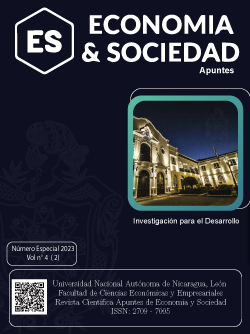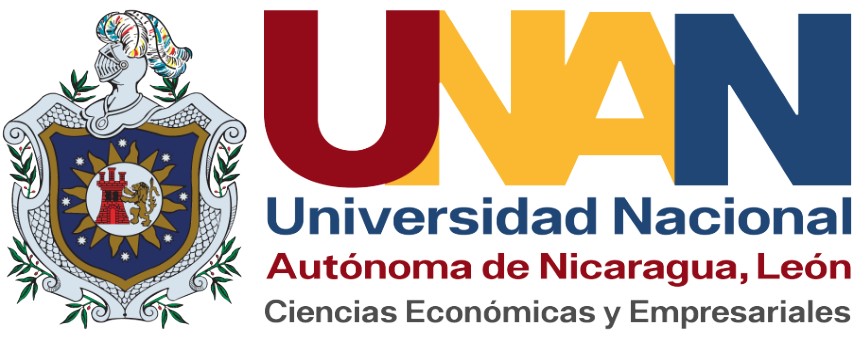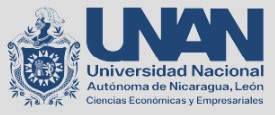University education for sustainable development: the disposition towards critical thinking of the postgraduate students in education
DOI:
https://doi.org/10.5377/aes.v4i2.16538Keywords:
Sustainable Development Goals, open thinking, initial training, university teaching, sustainable skillsAbstract
A key competency for advancing the 2030 Agenda is critical thinking. Therefore, the purpose of this study was to know the disposition towards critical thinking of the students of the Master’s degree in Educational Research (MER) and Master's degree in Academic Staff of Secondary Education (MASSE) of the University of Alicante (Spain). For this purpose, the quantitative method was used. The sample consisted of 54 participants and the instrument with which the data collection was carried out was the Critical Thinking Motivation Scale of Valenzuela (2007). The data analysis was conducted with SPSS v. 26 software. The main findings show that the usefulness of critical thinking was the most valued, followed by the factors importance and interest, while the factor that obtained the lowest average rating was expectation. When segregating the sample by the type of master's degree, some differences were found in the utility factor, being the MER students who gave a greater relevance. Participants were aware of the importance of acquiring critical thinking skills for their good professional and personal performance; However, they had few expectations of themselves. It is concluded that it is necessary to strengthen their self-esteem and self-confidence through specific training programs.
Downloads
References
Adalid, M., Carmona, C., Vidal, J., y Benlloch, M. (2018). Competencias interculturales en Educación Superior: Aspecto clave para la movilidad. Education in the Knowledge Society (EKS), 19(1), 97–114. https://doi.org/10.14201/eks201819197114
Akgün, A., & Duruk, U. (2016). The investigation of preservice science teachers’ critical thinking dispositions in the context of personal and social factors. Science Education International, 27 (1). 3–15. https://eric.ed.gov/?id=EJ1100164
Alvarado-Tovar, P.E. (2014). El desarrollo del pensamiento crítico: una necesidad en la formación de los estudiantes universitarios. Didac, 64. 10-17. Recuperado de: https://biblat.unam.mx/hevila/Didac/2014/no64/2.pdf
Albareda-Tiana, S., Vidal-Raméntol, S., Pujol-Valls, M., & Fernández-Morilla, M. (2018). Holistic approaches to develop sustainability and research competencies in pre-service teacher training. Sustainability, 10(10). 3698. https://doi.org/10.3390/su10103698
Arsal, Z. (2015). The Effects of Microteaching on the Critical Thinking Dispositions of Pre-service Teachers. Australian Journal of Teacher Education, 40(3). 140-153. http://dx.doi.org/10.14221/ajte.2014v40n3.9
Arsal, Z. (2017). The impact of inquiry-based learning on the critical thinking dispositions of pre-service science teachers. International Journal of Science Education, 39(10). 1326-1338. http://dx.doi.org/10.1080/09500693.2017.1329564
As' ari, A. R., Mahmudi A., & Nuerlaelah. E. (2017). Our prospective mathematic teachers are not critical thinkers yet. Journal on Mathematics Education, 8(2). 145-156. http://dx.doi.org/10.22342/jme.8.2.3961.145-156
Baena-Morales, S., Merma Molina. G., y Gavilán-Martín. D. (2021). ¿Qué conocen los profesores de Educación Física sobre los Objetivos de Desarrollo Sostenible? Un estudio cualitativo-exploratorio. Retos, 42. 452-463. Doi: https://doi.org/10.47197/retos.v42i0.87724
Bakır, S. (2015). Critical thinking dispositions of pre-service teachers. Educational Research and Reviews, 10(2). 225–233. https://doi.org/0.5897/ERR2014.2021
Bejarano, L. M., Galván. F. E., & López, B. (2014). Pensamiento crítico y motivación hacia el pensamiento crítico en estudiantes de psicología. Aletheia, 6(2). 202-223. Recuperado de https://doi.org/10.11600/ale.v6i2.218
Bell, R., & Loon. M. (2015). Reprint: The impact of critical thinking disposition on learning using business simulations. The International Journal of Management Education, 13(3) 362–370. https://doi.org/10.1016/j.ijme.2015.10.003
Biberhofer, P. (2019). Transformative learning at the science-society interface in higher education for sustainable development [PhD Disertation]. University of Economics and Business.Vienna.
Bravo, E., Mero, M. B., del Barco, M. A. H., y Jiménez, V. M. (2022). Las emociones en ciencias en la formación inicial del profesorado de infantil y primaria. Revista Interuniversitaria De Formación Del Profesorado. Continuación De La Antigua Revista De Escuelas Normales, 97(36.1). https://doi.org/10.47553/rifop.v97i36.1.92426
Cansoy, R., & Türkoglu. M. E. (2017). Examining the relationship between pre-service teachers' critical thinking disposition, problem solving skills and teacher self-efficacy. International Education Studies, 10(6). 23-35. https://doi.org/10.5539/ies.v10n6p23
Changwong, K., Sukkamart. A., & Sisan. B. (2018). Critical thinking skill development: Analysis of a new learning management model for Thai high schools. Journal of International Studies. 11(2). 37-48. https://doi.org/10.14254/2071-8330.2018/11-2/3
Cheng, M. H. & Wan. Z. H. (2017). Exploring the effects of classroom learning environment on critical thinking skills and disposition: A study of Hong Kong 12 th graders in Liberal Studies. Thinking Skills and Creativity, 24. 152-163. https://doi.org/10.1016/j.tsc.2017.03.001
De la Cruz, P. (2017). Expectativas y valoración del pensamiento crítico de estudiantes de ingeniería de la Universidad Continental, Huancayo. Apuntes de Ciencia & Sociedad. 7(1). 32-38. Doi: https://doi.org/10.18259/acs.2017006
Eccles, J. S. & Wigfield, A. (2002). Motivational Beliefs, Values, and Goals. Annual Review of Psychology, 53. 109-132. https://doi.org/10.1146/annurev.psych.53.100901.135153
Ennis, R. H. (1962). A concept of critical thinking. Harvard Educational Review, 32(1), 81–111.
Ennis, R. (1985). Critical thinking and the curriculum. National Forum: Phi Kappa Phi Journal, 65(1). 28-31.
Ennis, R. H. (1996). Critical thinking dispositions: their nature and assessability. Informal Logic, 18(2). 165-182. https://doi.org/10.22329/il.v18i2.2378
Ennis, R. H. (2011). The nature of critical thinking: An outline of critical thinking dispositions and abilities. University of Illinois, 2(4). 1-8. Recuperado de: https://education.illinois.edu/docs/default-source/faculty-documents/robert-ennis/thenatureofcriticalthinking_51711_000.pdf
Facione, P.A., & Facione, N. C. (1992). The California critical thinking disposition inventory. Millbrae, CA: California Academic Press.
Facione, P.A. (2000). The Disposition Toward Critical Thinking: Its Character, Measurement, and Relationship to Critical Thinking Skill. Informal Logic. 20(1). 61-84. https://doi.org/10.22329/il.v20i1.2254
Facione, P., & Gittensg, C.A. (2013). “Think critically” (2nd ed.). Englewood Cliffs, NJ: Pearson
Förster, R., Zimmermann. A. B., & Mader. C. (2019). Transformative teaching in higher education for sustainable development: Facing the challenges. GAIA-Ecological Perspectives for Science and Society. 28(3). 324-326. https://doi.org/10.14512/gaia.28.3.18
García-González, E., Jiménez-Fontana, R., Azcárate, P., & Cardeñoso. J. M. (2017). Inclusion of sustainability in university classrooms through methodology. In Handbook of theory and practice of sustainable development in higher education (pp. 3-19). Springer. https://doi.org/10.1007/978-3-319-47868-5_1
Gómez-Gómez, M. P., y Botero-Bedoya. S. M. (2020). Apreciación del docente para contribuir al desarrollo del pensamiento crítico. Eleuthera, 22(2). 15–30. https://doi.org/10.17151/eleu.2020.22.2.2
Keys, P. W., Galaz. V., Dyer. M., Matthews. N., Folke. C., Nyström. M., & Cornell. S. E. (2019). Anthropocene risk. Nature Sustainability, 2(8), 667-673. https://doi.org/10.1038/s41893-019-0327-x
Martínez-Virto, L., & Pérez-Eransus. B. (2021). The role of the Public University of Navarre in achieving the 1st SDG for the end of poverty. Sustainability. 13(17). 9795. https://doi.org/10.3390/su13179795
Mendoza Guerrero, P. L. (2015). La investigación y el desarrollo de pensamiento crítico en estudiantes universitarios (Tesis Doctoral). Universidad de Málaga. Málaga. Recuperado de http://hdl.handle.net/10630/11883
Moreno, J., Rodríguez, L., y Favara, J. (2019). Conciencia ambiental en estudiantes universitarios. Un estudio de la jerarquización de los Objetivos de Desarrollo Sustentable (ODS). Revista de Psicología, 15(29). 113–119. Recuperado de https://erevistas.uca.edu.ar/index.php/RPSI/article/view/2115
Organización de las Naciones Unidas. (2015). Transformar nuestro mundo: la Agenda 2030 para el Desarrollo Sostenible [Resolución de la Asamblea General de las Naciones Unidas A/RES/70/1]. Obtenido de https://undocs.org/es/A/RES/70/1
Parra, E., y Lago de Vergara, D. (2003). Didáctica para el desarrollo del pensamiento crítico en estudiantes universitarios. Educacion Medica Superior, 17(2). 627-920.
Paul, R. & Elder, L. (2008). Critical Thinking: Strategies for Improving Student Learning. Part II. Journal of Developmental Education, 32(2). 34-35. https://eric.ed.gov/?id=EJ868666
Pegalajar-Palomino, M. C., Burgos-García, A., & Martinez-Valdivia, E. (2021). What Does Education for Sustainable Development Offer in Initial Teacher Training? A Systematic Review. Journal of Teacher Education for Sustainability, 23(1). 99-114. https://doi.org/10.2478/jtes-2021-0008
Ramos, C., y González, B. (2020). Orientación Vocacional. Aprendizaje Socioemocional y Sentido de Vida en la Educación Superior. Revista Dilemas Contemporáneos: Educación. Política y Valores, 8(21). https://doi.org/10.46377/dilemas.v8i.2500
Ramos, D. I. (2021). Contribución de la educación superior a los Objetivos de Desarrollo Sostenible desde la docencia. Revista Española de Educación Comparada. 2020(37), 89-110. https://doi.org/10.5944/reec.37.2021.27763
Reeve, E. M. (2016). 21st-century skills needed by students in technical and vocational education and training (TVET). Asian International Journal of Social Sciences, 16(4). 65–82. https://doi.org/10.29139/aijss.20160404
Sagun, S., Ateşkan, A., & Onur, J. (2016). Developing Students for University through an International High School Program in Turkey. Journal of Educational Sciences: Theory & Practice, 16(2). 439-457. https://doi.org/10.12738/estp.2016.2.0313
Salazar-Gómez, E., y Tobón. S. (2018). Análisis documental del proceso de formación docente acorde con la sociedad del conocimiento. Revista Espacios. 39(53).
Sánchez, F., Segalàs. J., Cabré, J., Climent, J., López, D., Martín, C., y Vidal, E. (2017). El proyecto EDINSOST: inclusión de los ODS en la educación superior. Revista Española de Desarrollo y Cooperación. (41). 67-81.
Skjerven, A., & Reitan, J. (Eds.). (2017). Design for a Sustainable Culture: Perspectives, Practices and Education (1st ed.). London, England: Routledge. Doi: https://doi.org/10.4324/9781315229065
Tishman, S., Jay. E., & Perkins. D. N. (1993). Teaching thinking dispositions: From transmission to enculturation. Theory into Practice. 32(3). 147-153. Recuperado de https://www.jstor.org/stable/1476695
UNESCO (2017). Education for Sustainable Development Goals: Learning Objectives. UNESCO Publishing. https://unesdoc.unesco.org/ark:/48223/pf0000247444
Uslu, S. (2020). Critical Thinking Dispositions of Social Studies Teacher Candidates. Asian Journal of Education and Training, 6(1), 72–79. https://doi.org/10.20448/journal.522.2020.61.72.79
Valenzuela, J. (2007). Escala motivacional de pensamiento crítico. Universidad de Salamanca. Recuperado de: http://tinyurl.com/EMPC-sp
Vega-Marcote, P., Varela-Losada, M., & Álvarez-Suárez, P. (2015). Evaluation of an educational model based on the development of sustainable competencies in basic teacher training in Spain. Sustainability. 7 (3) 2603–2622. https://doi.org/10.3390/su7032603
Zhang, C., Fan. H., Xia. J., Guo. H., Jiang. X., & Yan. Y. (2017). The effects of reflective training on the disposition of critical thinking for nursing students in China: A controlled trial. Asian Nursing Research, 11(3). 194-200. https://doi.org/10.1016/j.anr.2017.07.002
Published
How to Cite
Issue
Section
License
Copyright (c) 2023 Universidad Nacional Autónoma de Nicaragua, León

This work is licensed under a Creative Commons Attribution-NonCommercial-ShareAlike 4.0 International License.














